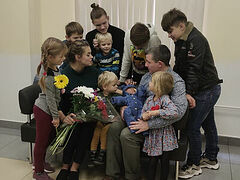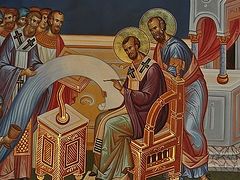Many families of today are literally fighting for a chance to become parents. They consult all kinds of medical specialists with the goal of discovering the joy of parenthood. But what’s most striking is that, right next to them, there are couples making up all sorts of reasons to avoid getting pregnant despite being perfectly fertile and healthy. They don’t give the slightest thought to the fact that later, when they happen to discover their parental instincts now so carefully tucked away, they will suddenly realize it’s too late and their chance to receive the blessed fruit of their love has been irreversibly lost.
A major problem here lies in those people themselves, who often come unprepared to share life as a family: they see the world through a prism of self-interests, thinking exclusively of themselves.
To create a family means to denounce oneself for the sake of the love of your neighbor. On the whole, I think that family is akin to a monastery
To create a family is about denouncing oneself for the sake of the love of your neighbor. On the whole, I think that family is akin to a monastery. A monk at his tonsure takes three vows: to live in chastity, poverty, and obedience. If these principles were kept in family life, we would have a completely different outcome than the one we are facing today. One should keep his desires at bay, preserve physical and spiritual purity; money should be a shared resource, with no one furtively trying to stash it away, because both the husband’s and the wife’s major goal is to acquire spiritual wealth. Besides, mutual understanding and obedience to one another would help them to keep peace in their family.
The happiness and wellbeing of every family are made up of not just the children but also a life full of virtues.
Family planning so fashionable these days has led to a decline in the birth rate. The majority of couples have been pre-programmed to have either one or a maximum of two children, and if anyone dares to have three, or worse, four, some of them would have to face their doctors crying foul. Public opinion would jump in as well: “Why do you need a large family? You should enjoy life for yourself first! How will you pay for such a big family?” These and other comments addressed to the parents of large families speak of a grim reality: Children aren’t the priority any longer.
It often happens that a young couple doesn’t think of children as a blessing or a gift but rather as a burden. “We have other problems to deal with, we are busy doing other things, we’ve got so many plans on our mind…” And if some couples after becoming parents go to the extreme of practically deifying their child, others simply don’t care who their kids will be in the future.
Once, in the company of some Jewish friends, I overheard the expression, “a stolen child”. Our conversation was about children who grew up isolated from the traditional Jewish ways of upbringing.
In modern times, we have plenty of so-called “underworld traditions” that steal our souls, with our children becoming the first victims. These are: parental indifference, when parents lead lives full of vices that badly affect young and still forming minds, the media, easy access to the latest advancements of the IT industry, street upbringing, and fake friendships…
What should we do to save our children and instill real values in them, and what does the Church offer in this respect? We will try to discuss this below.
We have to admit that we have ended up in a deep crisis: Family and schools have no idea how to keep children within limits. We can say that the time has come when our children are in charge of us, the adults. Quite possibly, we spent too much time experimenting, introducing many new methods of education and upbringing, but all of them produce the opposite effect.
For over fifteen years, I have been observing all kinds of school experiments borrowed from abroad and carried out with eyes wide shut. Some have even managed to get filthy rich as a result of these experiments. But so many associations keep pushing and adopting the growing number of new projects in the area of education in an attempt to invent something so wondrously unusual, aimed at presenting new concepts, methods, and procedures, when everything on this borrowed smorgasbord remains too foreign for our society and its morals.
Unfortunately, none of these innovators have tried to appeal to the Holy Scripture and the teachings of the Church—the most trustworthy source, tested through the centuries. It is the method that has given so much good fruit and formed such a great number of worthy people.
“A child is an original Biblical creation. A child is the creation of an undefiled life, a flower that opens to the world and aspirs to attain simplicity and beauty. A child is the reflection of a fraction of the sky gifted to man together with the dawn of creation,” stated Ernst Bernie, Romanian sociologist, anthropologist, and philosopher.
In light of this reality, society should rather offer active help to parents in finding the correct ways to educate and nurture their children.
“You have a sacred obligation before the child you have brought into this world to bring him up in the fear of God; if he doesn’t grasp it when told nicely, you must correct him for disobedience—but these days, you have lost the right to bring him up in a traditional way. How did we fall so far? It is done exclusively with one goal in mind: to lure mankind into the trap of hellish immorality. And they dare to call it “human rights”… The work of satan has reached its apogee. No one wants to hear the voice of the Church, no one cares about the Truth. When someone punishes their child, immediately they will come running, brandishing their “human rights:” “How do you dare to scold your son for indulging in lechery? It’s one of his rights.” Just think of it! The game is over. What else can you say?..” lamented elder Dionysius (Ignat), abbot of Kaliva in Kolchu Bay.
In the minds of modern people, the Bible contains brutality, and demands punishment for any mistake
The modern generation has been mentally penetrated in order to accept the stereotypes that flagrantly falsify the Bible as if all it has is brutality and punishment for any mistake. But the genuine message of the Scripture, including its educational narrative, is steeped in the spirit of love. To live in the fear of God means abstinence from sin and self-indulgence, and having feeling of shame, respect, and love of God and neighbor. On the whole, “Christianity is the school of happiness,” writes Fr. Nicolae (Steinhardt).
“The most valuable legacy that parents can leave their children is a happy childhood and tender memories about their father and mother. These memories will light up their future days, protect them from temptations, and help them weather the challenges of their daily life when the time comes for them to leave their sheltered life at home,” we read in the diaries of Tsarina and Passion Bearer Alexandra Fyodorovna.
Virtue can only be acquired through hard labor and by overcoming hurdles.
Our youth has to be educated in the spirit of Orthodoxy, paying attention to the changes in human nature that begin at the age of twelve. This is the age when instincts are awakened and brought to light. We must prepare our children for this moment of coming of age, so that they might avoid the fall. If they don’t fall but keep living an innocent life, they will be able to acquire the Holy Spirit Who dwells in man and Who will later guide this person, the child,” affirmed monk Mark (Dumitru), a well-known Romanian ascetic.
Modern society treats the Church more than reservedly. Whenever we ask parents to allow their children to attend the summer church camp organized annually by our parish, we are immediately bombarded with questions: “But what will you do there with them? Will you make them do prostrations? Belittle them? Threaten that St. Nicholas will punish them?i Once at the camp, we often discover that some kids are quite disorderly and ill-bred, all because they were allowed anything and everything, had no taboos and grew up unsupervised in a dysfunctional family.
Without a doubt, it is their parents’ fault as they allowed them everything, and as a result, before their children reached adolescence, their minds and souls were already poisoned with the false comforts of modern life. Their parents didn’t shield or protect their offspring.
“In our society, the children learn all about the sins of the flesh by the time they turn fourteen or fifteen, at a much younger age than did adults of previous generations learned. The children fully understand what they watch on the screen in the movies or what’s going on around them in their daily life and they live in an atmosphere of immorality. Some would say: “But why should we fight it? It’s so natural!” In so doing, they make the soil fertile for promiscuity and sinfulness,” wrote Hieromonk Seraphim Rose.
If we keep tolerating and fostering sin, we will live in a sick society! More often than not, the parents themselves—non-believing, unruly, and morally bankrupt—are the main enemies of their children. Having children means bearing a heavy load of responsibility.
I am not sure if there is an organization anywhere in the world that would set up a preparational exam for young people aspiring to build a family, give birth, and bring up a child. Traditionally, family and the community took on this role, and consequently, the Church. After all, the Church is above all the parish and the community, or a congregation of faithful who reside in the same area or region.
According to stories shared by our grandfathers and grandmothers, in olden times, if someone you knew noticed that you didn’t say hello or that you talked back, or somehow acted inappropriately, your parents would immediately learn about it. And they’d react without any delay. Thus, the youth was brought up by the community as a whole. And the Church was an ultimate participant in this process. Before the wedding, a young couple surely had to talk with a priest. A couple-to-be was given guidance; or as they used to say at the time, they were set on the right path. And even later, long after the wedding, both the parents and the Church remained close to the newlyweds and observed how they handled married life. As a rule, two senior generations of a young couple’s immediate and extended family willingly offered support, either morally, physically (for example, during the construction of a house), or financially—but they’d always assist in anything relating to the development and the upbringing of children.
Young people are forced to make decisions independently and these decisions often turn out to be immature or plain wrong
In our times, many young people are practically left defenseless. Their parents are either divorced or hired to work in far-away countries, and they are generally self-centered and bad-natured people. Young people are forced to make decisions independently that often turn out to be immature or plain wrong. Hence we arrive at rather sorrowful statistics on the number of divorces and abandoned children who have no one to bring them up.
It so happens that a young couple got married, but they weren’t prepared for adulthood. They also don’t have parents around who can support or direct them, no one around but strangers who couldn’t care less. So, it turns out that this couple can’t jointly handle the hardships of life. Thus, they divorce.
To deprive a little child of nurturing and care is practically identical to building a house without a foundation, for no good can come out of it. “A solid upbringing is exactly what lies at the root of everything good in this world,” asserted Emmanuel Kant. Correct education is the only tool that helps a man get a firm grasp on essential things in life, on how to struggle, overcome hurdles, and become independent—but as a result, how to excel as an individual. Nicolae Iorga very succinctly pointed out: “Upbringing is always a skyline and never a destination point.” The traditional saying reads as follows: “You will get back everything you are teaching your child.” It is true for any society and it remains valid at all times. So, quite possibly we ought to channel large investment funds into the area of education and upbringing, in order to gather plentiful and blessed fruit in the future. It would be great if we concentrated our efforts on this sacred mission—UPBRINGING.
We risk losing our child if he doesn’t receive an adequate upbringing, which should include a set of values and models of correct behavior. More than once was I able to observe children old enough to exhibit their character traits and behavior style; a seven-year-old child is old enough to have an adult-like conversation. At this age, a child should be already familiarized with general concepts of life and keep to a particular line of behavior in order to gradually evolve as a personality. If parents and teachers involved in the upbringing of children aren’t promoting the development of a moral understanding of the world, it will produce “cracks” and “blind spots” in the children’s process of personal growth. Moreover, they will experience adverse effects for the rest of their lives.
A student’s brain isn’t a vessel that needs to be filled, but a torch that should be lit
How many of those young souls on the verge of becoming adults today remain the center of attention and care on the part of both parents? How many parents today are ready to give up personal interests for the sake of the development and nurturing of their children? “A student’s brain isn’t a vessel that needs to be filled, but a torch that should be lit,” Plutarch used to say. It should be appreciated that everyone is born as a unique person, and each one of us has a special kind of life journey and a specific calling. That’s why each child should be treated individually. But how often do we, parents and the teachers, have to be not only mentors, but also help our children adapt their abilities to the realities of life and define their vocation.
From the religious point of view, a child needs help at discovering another reality— an invisible one—and let him acknowledge there is someone, and that Someone is God. We have to direct the child so that he would yearn to achieve the ultimate goal—to become a perfect human being; that is, to be filled with holiness.
“Those who withhold religion from children commit a crime with regards to them as people in this world, and for their salvation in the eternity; to deprive a child of religious upbringing is the same as if surgically removing their soul or taking away a person’s most valuable possessions,” wrote Vasile Băncilă, the Romanian philosopher, teacher, and essayist.
We pray that God bestows good intentions on all of us who are responsible for education and nurturing, so that we are gifted with a talent to sow seeds of virtue in our children’s souls. To accomplish this, the teachers must also be models of perfection, as well as virtuous and nurturing people.
Not too long ago, I spoke with a woman, a lecturer in law and a single mother to a six-year-old daughter who was just about to start school. The last year before the daughter’s first year of school was especially challenging because she had to bring her child everywhere she went. I asked her why she didn’t take her daughter to the kindergarten, and heard the following in response: A girl was already taking preparatory classes at the kindergarten, but one day she came home in tears and asked her mom: “Mom, what does the word “soul” mean?” When her mother asked her what caused such distress, the child admitted that a teacher didn’t allow a hug, but pushed her aside saying: “Keep off, don’t dig into my soul!”
To bring up a child is a lot harder than to educate him. That’s why there are few mentors among a great number of enlightened teachers
It’s true that “a true teacher must be, to a great extent, concerned more about the state of his own character than the character and activities of a child,” said George G. Antonescu, the renowned Romanian teacher. The factor of upbringing looms large, and how easily can the child’s soul be seriously traumatized by the wrong approach and the absence of love. “To bring up a child is a lot harder than to educate him. That’s why there are so few real mentors among the great number of enlightened teachers,” wrote Vasile Conta, Romanian philosopher, writer, and politician of the nineteenth century.
Let us beseech God to gain the wisdom and knowledge to see how, step by step, we should form every soul entrusted to us.
“We can safely affirm that we are Christians to the measure that we can preserve the pure sense of childhood in ourselves till the end of our life,” wrote Nikifor Krainik.
Our main duty is to surround the children with care and prevent any harmful influence from entering their souls or stealing them from us. Let us attend!





